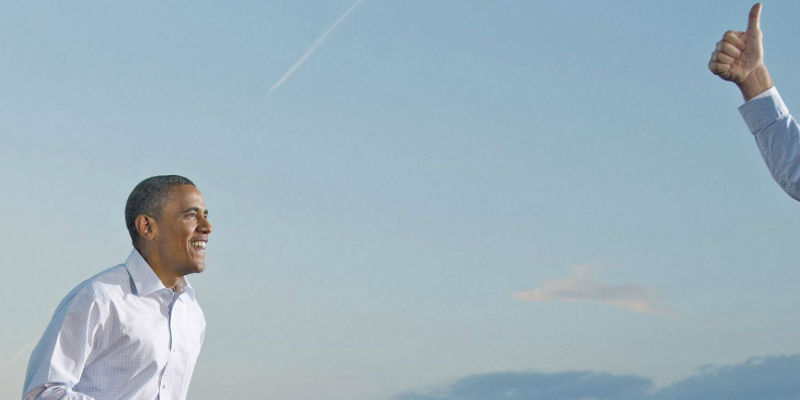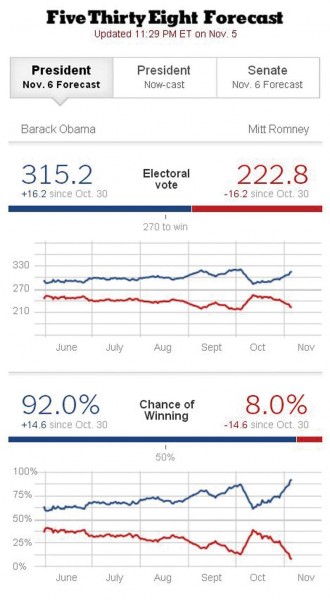Pollsters see Obama win

FINISH LINE In this Aug. 14 file photo, President Barack Obama is greeted on stage by a thumbs-up from Mike Dufel of Cedar Falls, Iowa, during a campaign event at Waterloo Center for the Arts in Iowa. AP
WASHINGTON—As tens of millions of Americans voted on Tuesday in the most expensive presidential race in US history, about a dozen national polls showed President Barack Obama holding the upper hand over Mitt Romney in the battle for leadership of the world’s most powerful country.
A few other polls showed the 51-year-old Democratic incumbent and the 65-year-old Republican challenger deadlocked in a race expected to be decided in a handful of states where the fight was seen to be extraordinarily close.
At least 120 million Americans were expected to vote on giving Obama a second term or replacing him with Romney after the most expensive campaign in history—described as the world’s greatest political show—in which the rival camps unleashed $6 billion in an 18-month roller-coaster ride.
Their decision will set the country’s course for four years on spending, taxes, healthcare and foreign policy challenges, like the rise of China and Iran’s nuclear ambitions.
While some polls show Obama and Romney in a virtual dead heat, the Democratic incumbent has a slight advantage in several vital swing states—most notably Ohio—that could give him the 270 electoral votes he needs to win.
Article continues after this advertisementThe first results, by tradition, were tallied in Dixville Notch and Hart’s Location in New Hampshire. Obama and Romney each received five votes in Dixville Notch. In Hart’s Location, Obama got 23 votes to 9 for Romney and two votes for Libertarian candidate Gary Johnson.
Article continues after this advertisementUnder the US system, the winner of the presidential election is not determined by the nationwide popular vote but in state-by-state contests. The candidate who wins a state—with Maine and Nebraska the exceptions—is awarded all of that state’s electoral votes, which are apportioned based on representation in Congress.
Romney, the multimillionaire former head of a private equity fund, is aiming to be the first Mormon president and one of the wealthiest Americans to occupy the White House. Obama, the first black president, is vying to be the first Democrat to win a second term since Bill Clinton in 1996.
Obama lead
The most recent set of polls suggest a problem for Romney, whose momentum stalled out in mid-October, according to statistician and analyst Nate Silver in his FiveThirtyEight blog posted by The New York Times. Instead, it was President Obama who was making gains.
Among 12 national polls published on Monday, Obama led by an average of 1.6 percentage points. Perhaps more important was the trend in the surveys. On average, Obama gained 1.5 percentage points from the prior edition of the same polls, improving his standing in nine of the surveys while losing ground in just one.
Because these surveys had large sample sizes, the trend was both statistically and practically meaningful, according to Silver. Whether because of Superstorm “Sandy,” the relatively good economic news of late, or other factors, Obama appeared to have gained ground in the closing days of the race.
The national polls ranged from showing a 1-point lead for Romney to slightly more than a 4-point advantage for Obama. The forecast of the national popular vote was within this range, projecting Obama’s most likely margin of victory to be 2 or 3 percentage points, approximating the margin that George W. Bush achieved in defeating John Kerry in 2004.
Biggest problem for Romney
Romney’s chances are less of winning the needed 270 electoral votes, according to the Times article. The large majority of polls in battleground states over the past three days showed leads for Obama. On Monday, 19 battleground state polls found leads for the president, as compared with just three for Romney.
Ohio remained the largest problem for Romney, where he had been behind in most polls all year.
Obama could secure the victory by winning Wisconsin, Nevada and Pennsylvania, along with Ohio.
Fueled by record spending on negative ads, the battle was focused primarily on the lagging economic recovery and persistent high unemployment, but at times it turned personal.
Divided Congress
The close race has raised fears of a disputed outcome similar to the 2000 election, which was decided by the US Supreme Court. Both campaigns have assembled legal teams to deal with possible voting problems, challenges or recounts.
The balance of power in Congress will also be at stake in Senate and House of Representatives races that could impact the outcome of “fiscal cliff” negotiations on spending cuts and tax increases, which kick in at the end of the year unless a deal is reached.
Obama’s Democrats are now expected to narrowly hold their Senate majority, while Romney’s Republicans are favored to retain House control.
The likelihood of another divided Congress means that whoever wins the White House will have to contend with the same partisan legislative struggles that dogged Obama’s term.
Voter turnout crucial
Obama appeared in September to be cruising to a relatively easy win after a strong party convention and a series of stumbles by Romney, including a secretly recorded video showing the Republican writing off 47 percent of the electorate as government-dependent victims.
But Romney rebounded in the first debate on Oct. 3, when his sure-footed criticism of the president and Obama’s listless response started a slow rise for Romney in polls. Obama seemed to regain his footing in recent days at the head of federal relief efforts for victims of Sandy.
The contest is likely to be determined by voter turnout—specifically, what combination of Republicans, Democrats, white, minority, young, old and independent voters showed up at polling stations.
Obama and Romney raced through seven battleground states on the final day of campaigning to hammer home their final themes, urge supporters to get to the polls and woo the last remaining undecided voters.
Steeped in nostalgia
Obama focused on Wisconsin, Ohio and Iowa, the three swing states that, barring surprises elsewhere, would give him 270 electoral votes. Romney visited the must-win states of Florida, Virginia and Ohio before finishing in New Hampshire, where he launched his presidential run in June 2011.
After two days of nearly round-the-clock travel, Obama wrapped up his final campaign tour in Des Moines, Iowa, with a speech steeped in nostalgia that hearkened back to his 2008 campaign.
“I’ve come back to Iowa one more time to ask for your vote. I came back to ask you to help us finish what we’ve started, because this is where our movement for change began,” he told some 20,000 people.
Obama’s voice broke and he wiped away tears from his eyes as he reflected on those who had helped his campaign.
Partisan gridlock

Romney sought to mine frustration with the slow pace of the economic recovery and argued that the president was out of ideas and had no clue how to create jobs, with unemployment at 7.9 percent and millions out of work.
No president since World War II has been elected with the unemployment rate above 7.4 percent, and Obama is hoping to avoid the fate of a host of European leaders who paid for the economic crisis with their jobs.
Romney argued he was the candidate who could break the partisan gridlock in Washington, and said four more years of Obama could mean another economic recession.
He assailed Obama’s economic policies amid the recession, and promised to bring change that he asserted Obama had only talked about.
“Talk is cheap, but a record is real,” Romney said.
Blacks, Hispanics
With many of the late polls in key states tilting slightly against him, Romney decided to campaign on Election Day in Ohio and Pennsylvania, before returning to his Boston home to wait out the returns.
Obama, who voted in October, will spend the day at his home in Chicago.
American voters will also weigh in on more than 170 state-wide ballots for everything from gay marriage to marijuana and abortion to electoral maps.
Vice President Joe Biden and Romney’s running mate Paul Ryan of Wisconsin also went through their final campaign paces in the handful of battleground states. Both sides say the winner will be determined by which campaign is better at getting its supporters to the polls.
The president needs the overwhelming support of blacks and Hispanics to counter Romney’s big lead among white men. At the same time, his support among minorities may have cooled slightly since the 2008 vote when there was the euphoria of making history by electing America’s first black president.